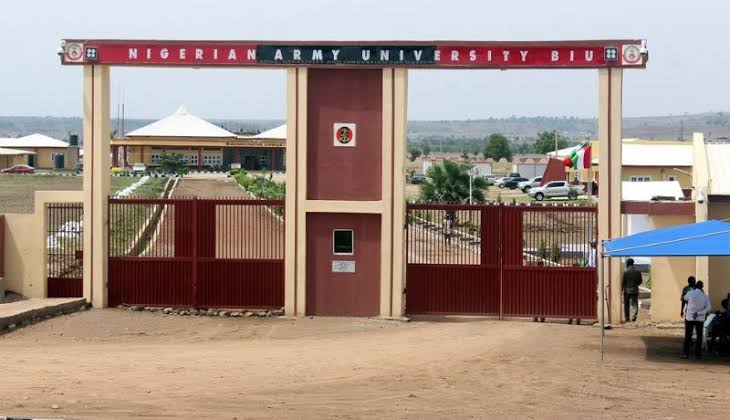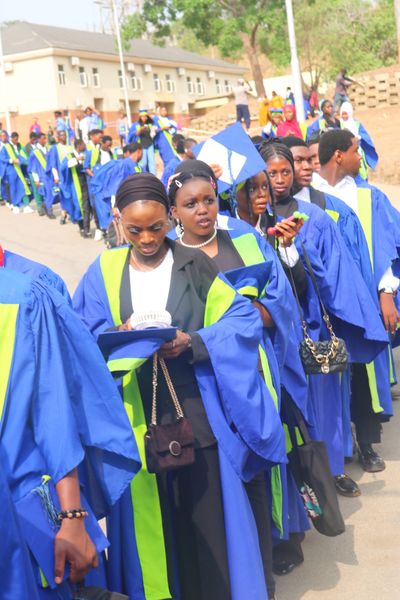NAUB: MR PRESIDENT, WHO ARE THOSE PLANNING TO KILL THE ONLY FEDERAL UNIVERSITY THAT DOES NOT GO ON STRIKE? By Femi Oyewale
Sahara Weekly Reveals That Higher education in Nigeria, quite frankly, is facing immense challenges including but not limited to poor infrastructure, unrealistic academic calendars resulting in extra years against stipulated durations, lack of teaching equipment, social menace, poor funding, amongst others.

Interestingly, Nigerian Army University, Biu (NAUB) is quite unique from other federal universities in the sense that since inception, there has not been any issue of strike, cultism, protest, or anti-social conduct.
Rather, the university is reputed for its excellent condition of learning environment.
This was aptly covered by the Governor of Borno State, H.E Professor Babagana Umara Zulum through his deputy during the maiden edition of the convocation ceremony of NAUB on Saturday, October 28th, 2023 at the University’s main campus ( note not temporary campus within five years of existence) in Biu, Borno State.
The Borno State governor said he was physically present at the groundbreaking ceremony of the foundation laying stone of NAUB five years ago, and he is impressed by what he has seen adding that it must take military precision and focus to put in a full-fledged and functional university on a barren land in such a short period.
The Governor further thanked the Federal Government, the Nigerian Army, the traditional rulers, scholars and academics philanthropist, industrialists, associates and men and women of goodwill from within and outside Borno State for the selfless service of gradually re-modelling the future of Borno State in particular and Nigeria in general and for putting Borno State on the path of further greatness through the Nigerian Army university, Biu.
Why then do we plan to abort such a great independent institution of learning known as a barrier breaker and line crosser by merging it with NDA whose missions and visions are not in tandem with each other .
Why cut short the dreams of such noble ideas via politics?
Are there those who do not want a stable educational system in Nigeria?
Are there external forces or their agents at home trying to destroy a good foundation for a stable educational system in Nigeria?
Is NAUB in competition with the private universities?
Are there big shots who benefit from a chaotic educational system in Nigeria?
Are there some subterranean forces working within the system to achieve the Boko Haram objective that “education is sin”?
The words of Governor Zulum rings a wise bell when he said that Boko Haram insurgents have achieved their objectives if the university is scrapped.
“Therefore, we appeal to Mr. President to look into this issue so that the Army University Biu would remain a university… because of the importance of education in this part of the country, where Boko Haram is saying that education is forbidden. And I think that by allowing this Army university to be scrapped, they might have achieved one or two of their objectives,” he said.
The governor noted that, for over a decade, Borno State has been facing a serious crisis that has denied many children access to education.
“Therefore, this university is very important to not only the people of Borno State but our neighbouring states,” he said.
Look at the Western countries that started with military polytechnics that propelled revolution in military equipment development.
Many of these developed countries collaborated jointly through civil-military research.
The Swedish Defence University established like NAUB is Sweden’s leading resource in, and first choice for, education, training and research in the management of crisis, war and periods of tension in the leadership of both civil and military agencies. The Swedish Defence University is an accredited institution for academic education for military and civilian students and researchers where different experiences, approaches, and traditions come together. It has become a hub for both national and international students.
It might shock you to know that American Military University (AMU) and American Public University (APU). APUS is wholly owned by American Public Education, Inc., a publicly traded private-sector corporation that offers associates, bachelors, masters, and doctoral degrees, in addition to dual degrees, certificate programs and learning tracks.
During my NYSC, I served in the Nigerian Army School of Education (NASE), Ilorin, which is a renowned military institution focused on providing high-quality education and training for Nigerian Army personnel and civilians. So why the proposed merger of NAUB?
Interestingly, the Nigerian Army University Biu provides such a platform for the Nigerian military towards technological innovation, research, and development in varied fields for national defence and security breakthroughs like many modern nations. In fact, instead of downgrading the Nigerian Army University, many more Army universities should be established in Nigeria. That is the way out for a caricature type of educational system that has failed to have stability over the years.
Who is not interested in seeing that a federal university graduates its students within the regular course time frame?
Must programmes of all federal universities be easily disrupted. A course of 4 or 5 years ends up taking over 6 to 7 years to complete. The worst part is that many universities end up in a crash programme to be able to cover up for the lost times. The terrible damage to these universities’ products is the very low standard of graduates.
Who wants the Nigerian educational system to collapse completely? These are rhetorical questions the amiable president of the Federal Republic of Nigeria and all stakeholders should ask those proposing the merger to answer us publicly, else should let the matter die forever in the abyss of hasty decision.





 Business6 months ago
Business6 months ago
 celebrity radar - gossips4 months ago
celebrity radar - gossips4 months ago
 celebrity radar - gossips4 months ago
celebrity radar - gossips4 months ago
 Business3 months ago
Business3 months ago










